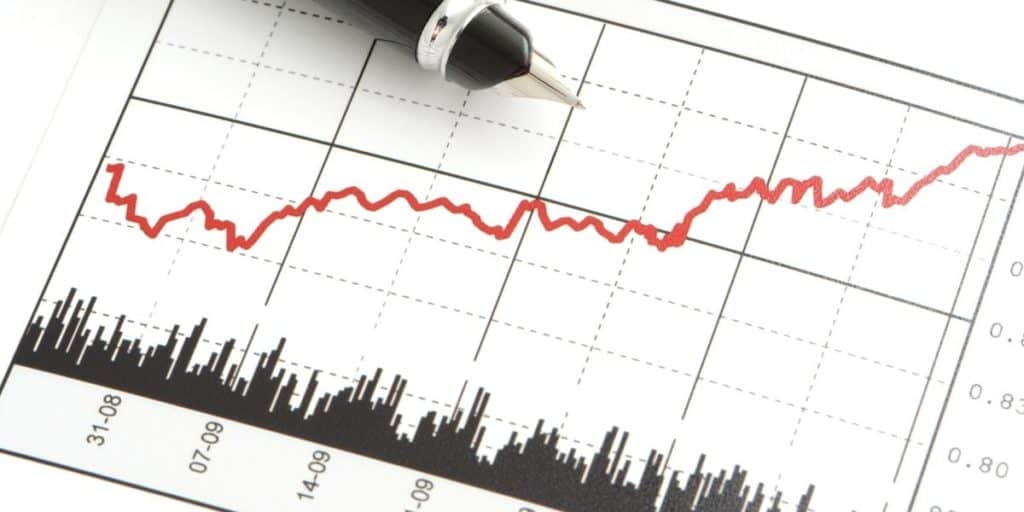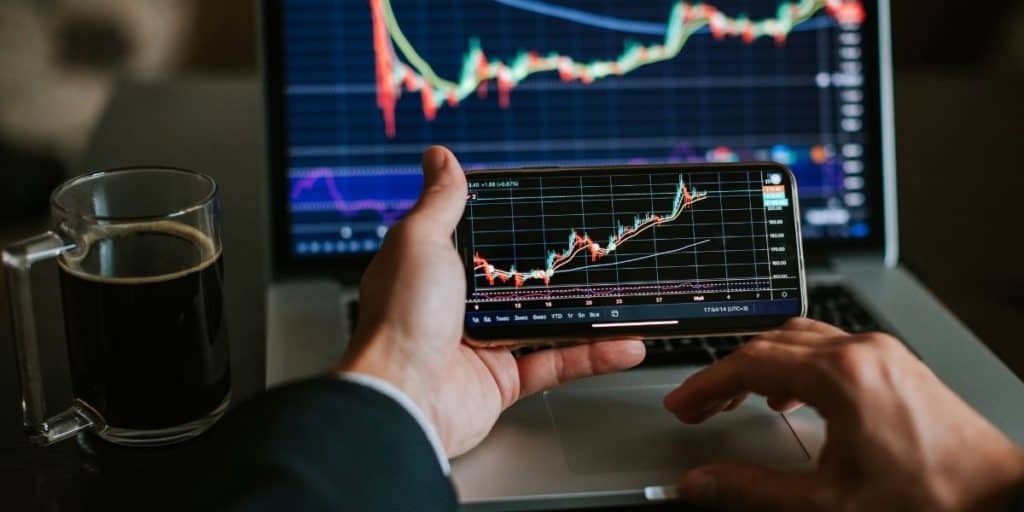Several money experts believe that passive investing is in a bubble. According to Bloomberg’s Gregor Hunter, the trillions in index funds distort the prices of stocks listed in the S&P 500. How do index funds affect stock prices?
Index funds do affect the stock prices, although their influence is minimal at best. When a company gets added or removed from an index, adjustments in index fund holdings do contribute to short term changes in its stock price.
The largest index funds have significant net assets. When any major index fund buys, sells, or holds, it will affect the stock prices of the underlying assets. Let’s keep going so you know what to do with your portfolio.
IMPORTANT SIDENOTE: I surveyed 1500+ traders to understand how social trading impacted their trading outcomes. The results shocked my belief system! Read my latest article: ‘Exploring Social Trading: Community, Profit, and Collaboration’ for my in-depth findings through the data collected from this survey!
Table of Contents
Why Do Index Funds Affect Stock Prices?
Stock markets around the world are dynamic, including the U.S. stock market. The market responds to all kinds of stimuli, including truths and rumors, reasonable expectations and wild speculations, rational sentiments, and absurdities.

When a stock is included in the S&P 500 or is added to the Dow Jones Industrial Average, its price undergoes substantial appreciation. Honeywell, Amgen, and Salesforce witnessed steady appreciation in August 2020, when news broke that they will be a part of the Dow.
When an index fund makes a move, there is some impact on the stock prices. While hedge funds, money managers, seasoned traders, institutional investors, or active individuals may not react, the herding tendency may influence other index funds.
Thus, the stock prices of underlying assets of an index fund may appreciate, depreciate, or hold based on the first catalyst.
7 Ways Index Funds Affect Stock Prices
The effects of index funds on stock prices are minimal at their strongest and nonexistent otherwise. The active players, institutional or retail investors, fund managers, or traders wield much more influence on the stock market and particular shares, securities, and other financial instruments.
The stock prices are more heavily influenced by the following:
- The policies of the U.S. Government
- The Treasury
- The Fed
- News
- Economic realities
- The performances of the publicly listed companies.
Active fund managers rely on an array of systems, from algorithms to complex analyses by experts, to make every decision.
Short-Term or Temporary Appreciation
When an index fund includes a particular stock in its list of underlying assets, there could be a little appreciation of its price. Other index funds may get slightly influenced to buy the same stock, which may sustain the nominal appreciation of the stock price.
Such effects are transient and short-term.
Short-Term or Temporary Depreciation
Depreciation of a stock price abides by the same principle as appreciation. If one or more index funds want to sell a particular stock, there is an increase in supply. If there aren’t enough buyers, then the demand is low.
This is why the stock price will undergo some depreciation, but this effect is temporary as well.
Status Quo and Overvaluation of Large-Cap Stocks
The status quo and the overvaluation of large-cap stocks are concerning effects of index funds. These are typical impacts on the appreciation and depreciation of individual stock prices.
These impacts can linger and could potentially have long-term consequences.
Index funds are designed and intended to hold stocks, especially from the large-cap and blue-chip companies. This status quo may not be feasible otherwise. Since most indexes prioritize blue-chip stocks and companies with large market caps, a certain degree of overvaluation becomes the norm.
Overvaluation leads to bloating and is detrimental for all investors.
Probable Long-Term Price Distortion of Underlying Stocks
The status quo and overvaluation of large-cap stocks tend to cause minor long-term distortion, which may or may not lead to a bubble. Also, the perceived valuation, right or wrong, is not limited to the more prominent players on an index.
The smaller companies on an index often don’t get the due recognition or attention from index funds because they try to go along with the market and secure a steady return. Unlike actively managed mutual funds or equity investors and traders, they don’t try to beat the market.
In any case, almost 90% of active fund managers tend to underperform against their respective benchmarks.
This approach doesn’t always affect those investing in index funds or the passive management of the mutual fund. Those investing in index funds are not looking for market-beating returns, phenomenal growth stocks, and speculative shorting or hedging options to make a windfall gain.
However, if any price distortion is not corrected in due course, a bubble will form, and it will burst sooner or later. Besides, ignoring worthwhile mid-cap or small-cap stocks irrespective of whether a fund is actively or passively managed is not ideal for an investor, trader, or the market as a whole.
Intermediate Contribution to Prevailing and Emerging Trends
Since its inception, index funds are not known for having caused any surge, plummet, or severe distortion in stock prices. It is natural for index funds to respond to real-time changes as they are supposed to mirror the market.
As major index funds react to market forces, the stock prices of underlying assets may spiral up or down the path per the trends.
Take the example of GE.
In 2008, GE’s stock price crashed by around 42%. In 2017, the stock fell by almost 45%. In 2018, GE was dropped from the Dow Jones Industrial Average, and since then, the stock price has continued to spiral downward.
During each such seismic event, index funds first try to hold a major stock. Then, the funds have to give in to the trends for different reasons.
- An index fund has to mirror the market.
- The fund cannot risk allowing the stock price to plummet into an abyss.
- All funds have contingency plans that necessitate some predetermined actions that are established as protocols.
There is an accentuating effect when an index fund responds to an emerging trend and buys or sells a large chunk of company shares. Thus, prevailing or emerging trends are reinforced, and the ripple effects are more potent when index funds and other well-known investors act or react.
Undervaluation of Mid-Cap and Small-Cap Stocks
The prioritization of large-cap stocks and their overvaluation often leads to undervaluing the mid-cap and small-cap stocks.
Small-cap stocks can be volatile in bearish markets, but their returns can be spectacular in bullish phases. Besides, small-cap and mid-cap companies have much more scope for growth than large-cap or blue-chip stocks.
Overvaluation, undervaluation, status quo, and other such systemic issues are usually due to herding tendencies among index funds. All passively managed funds aim for economies of scale.
The low expense ratios are counterbalanced by dealing in bulk volumes, which is why index funds play it safe. Index funds don’t pursue price discovery, thus affecting stock valuation and competition.
The effect could be positive or negative.
Holding has an impact, too, which may not be the right tactic given the actual value of a stock price, the company’s performance, and its near-term potential, or lack thereof.
Can Index Funds Sway the Stock Market?
Index funds cannot sway the stock market, especially if only a few funds make changes. The U.S. stock market is worth around $47 trillion. The largest index fund in the country has net assets worth $753 billion, which is around 1.6% of the total market cap of the U.S. stock market.
Index funds neither dump all their stocks at once nor double their holding immediately.
Veteran investors and traders have distinct strategies. Active retail investors don’t operate like passive mutual funds, index funds, or exchange-traded funds. Hence, a market-wide chain reaction is unlikely. Besides, there are systematic safeguards in place to prevent or mitigate a stock market crash.
Author’s Recommendations: Top Trading and Investment Resources To Consider
Before concluding this article, I wanted to share few trading and investment resources that I have vetted, with the help of 50+ consistently profitable traders, for you. I am confident that you will greatly benefit in your trading journey by considering one or more of these resources.
- Roadmap to Becoming a Consistently Profitable Trader: I surveyed 5000+ traders (and interviewed 50+ profitable traders) to create the best possible step by step trading guide for you. Read my article: ‘7 Proven Steps To Profitable Trading’ to learn about my findings from surveying 5000+ traders, and to learn how these learnings can be leveraged to your advantage.
- Best Broker For Trading Success: I reviewed 15+ brokers and discussed my findings with 50+ consistently profitable traders. Post all that assessment, the best all round broker that our collective minds picked was M1 Finance. If you are looking to open a brokerage account, choose M1 Finance. You just cannot go wrong with it! Click Here To Sign Up for M1 Finance Today!
- Best Trading Courses You Can Take For Free (or at extremely low cost): I reviewed 30+ trading courses to recommend you the best resource, and found Trading Strategies in Emerging Markets Specialization on Coursera to beat every other course on the market. Plus, if you complete this course within 7 days, it will cost you nothing and will be absolutely free! Click Here To Sign Up Today! (If you don’t find this course valuable, you can cancel anytime within the 7 days trial period and pay nothing.)
- Best Passive Investment Platform For Exponential (Potentially) Returns: By enabling passive investments into a Bitcoin ETF, Acorns gives you the best opportunity to make exponential returns on your passive investments. Plus, Acorns is currently offering a $15 bonus for simply singing up to their platform – so that is one opportunity you don’t want to miss! (assuming you are interested in this platform). Click Here To Get $15 Bonus By Signing Up For Acorns Today! (It will take you less than 5 mins to sign up, and it is totally worth it.)

Conclusion
The actions of all significant players in the stock market have reactions. All index funds collectively comprise a minority stake in the U.S. equities market, but actively managed funds are still the majority. Most effects on stock prices emanate from the actions of active investors, traders, and fund managers.
BEFORE YOU GO: Don’t forget to check out my latest article – ‘Exploring Social Trading: Community, Profit, and Collaboration’. I surveyed 1500+ traders to identify the impact social trading can have on your trading performance, and shared all my findings in this article. No matter where you are in your trading journey today, I am confident that you will find this article helpful!
Affiliate Disclosure: We participate in several affiliate programs and may be compensated if you make a purchase using our referral link, at no additional cost to you. You can, however, trust the integrity of our recommendation. Affiliate programs exist even for products that we are not recommending. We only choose to recommend you the products that we actually believe in.
